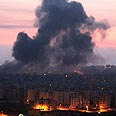
'Israel and the international community must learn from the mistakes of 1982'
צילום: רויטרס
Back to mutually assured destruction
Lebanon is the only country in all this that has almost nothing to do with the current impasse
The worst thing (to me) about the current war is that we've been forced into fighting a war with Lebanon – probably the country that least wants a conflict with Israel, and one of the only countries around that really has very little to do with the conflict.
As with everything that happens here, Lebanon II has got everyone under the sun owning in on what Israel should do now – trade Palestinian prisoners for kidnapped soldiers, recreate the security zone, pull out of the West Bank, give Lebanon (and Gaza, for that matter) the "Hama treatment" and bomb it back to the stone age.
Just about the only thing nearly everyone agrees on is that Syria and Iran, are the sources of the current war, and the faucet of Katushya rockets that have pummeled Israel must be closed via Damascus and/or Tehran.
No other option
But what would Israel's options be if not to fight back against Hizbullah? To declare war on Syria directly? Maybe. Last week's IAF flyover that buzzed Bashar al-Assad's palace in Damascus certainly confirmed what most military analysts have known for years: Syria's outmoded, rusting Soviet-built air defenses and fighter planes are no match for Israel's air power. In a war, Israel would likely achieve air superiority in a matter of hours.
But as former Chief of Staff Moshe Ya'alon told an audience in Washington Wednesday, air strikes are no substitute for ground troops. It's a lesson the Americans have learned over the past three years in Iraq, and Israel has learned over the past week in Lebanon and Gaza: After more than 1000 sorties over Lebanon during the past week, Katushyas continue to fly freely over the border.
Furthermore, even if, as is likely, the IDF vastly out measures its Syrian counterpart, a ground war will necessarily mean heavy losses. Furthermore, given Syria's clear military inferiority, IDF officials don't rule out the possibility Damascus could respond to a direct attack on Syria with a chemical or biological attack on Tel Aviv or Jerusalem, not to mention against IDF troops.
What about Iran?
So if Syria's out, what about Iran? After all, Tehran pulls the strings for Hizbullah, and Iran's involvement in attacks on Jewish targets around the world really the are a danger to Jews the world over, not just in Israel (just ask members of the Buenos Aires Jewish community).
But practically, taking on Iran is even less of an option than fighting Syria head-on, for a host of reasons. First there is the distance: As the crow flies, its 1000 miles (1600 kilometers) from Jerusalem to Tehran. But Israel's F-16s aren't crows, and Syria and Iraq are unlikely to grant Israel air rights to fly sorties over Iran.
That means Israeli air missions over Iran would begin near Eilat, fly south along the Red Sea, around the southern tip of Saudi Arabia, and up the Persian Gulf to hit Iran. Starting to sound unreasonable?
Iran no Iraq
In addition, Iran is highly unlikely to copy the "battle plan" of Saddam Hussein's soldiers in Iraq, who folded as soon as the invasion commenced and allowed the United States to march into Iraq virtually unopposed to depose their commander-in-chief.
According to the Global Security website, the Iranian army is a modern, well-equipped force that would present a tough challenge for Israel – even under ideal conditions.
That leaves the nuclear option – something not even the most strident hawks mention as a possibility.
Back to MAD
So where does this all leave us? In an updated version of the 1970's US – USSR nuclear policy: Mutually Assured Destruction. Israel won't attack Iran or Syria, knowing that such an attack would result in massive casualties at home. But Iran and Syria can continue attacking Israel via Hizbullah (either in Lebanon or in exile, with or without Hassan Nasrallah), knowing Israel's ability to respond directly to either country is limited or non-existent.
This leads back to Lebanon. This far into a war, it would be a terrible mistake if Israel gives up the fight with out pushing Hizbullah out of southern Lebanon, preferably out of Lebanon altogether. Failing to achieve even this minimal goal would render the deaths, injuries and property damage of the last week meaningless.
But after that initial goal, Israel and the international community must set about freeing Lebanon from the deadly clutches of Iran and Syria. The government in Beirut must reestablish sovereignty over the south of the country, or renounce its sovereignty over the area and pull its civilians out, as Israel did in Gaza.
Most importantly, Israel and the international community must learn from the mistakes of 1982, when Yasser Arafat was allowed to escape Beirut, only to set up his terror headquarters in Tunis a short time later. Once Hizbullah is expelled from Lebanon, countries that host group leaders (presumably to include Iran and Syria) must be ostracized and sidelined.
It is to difficult to see how the situation in the north will change without fundamental change vis-à-vis Iran, and to a lesser degree vis-à-vis Syria, by both the Israeli government and the international community. Until the roots of the friction are comprehensively dealt with, things will remain the same.
Andrew Friedman is opinion editor of Ynetnews










